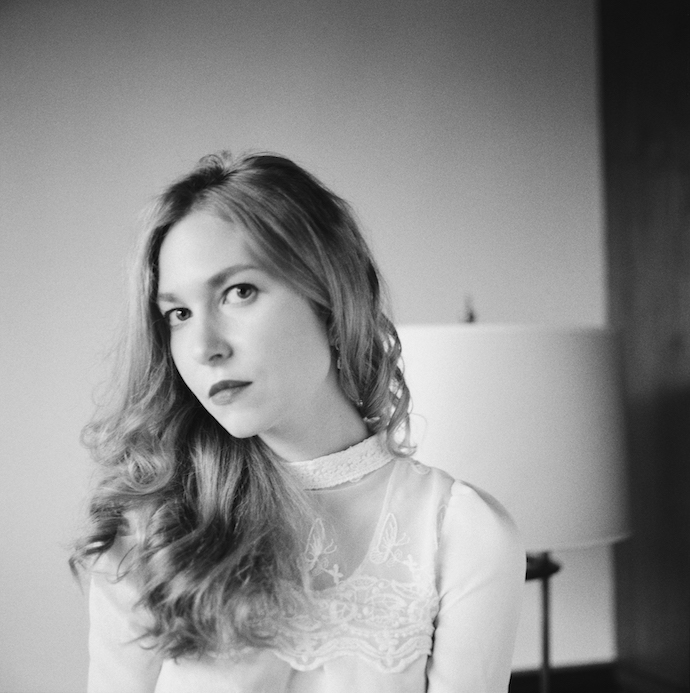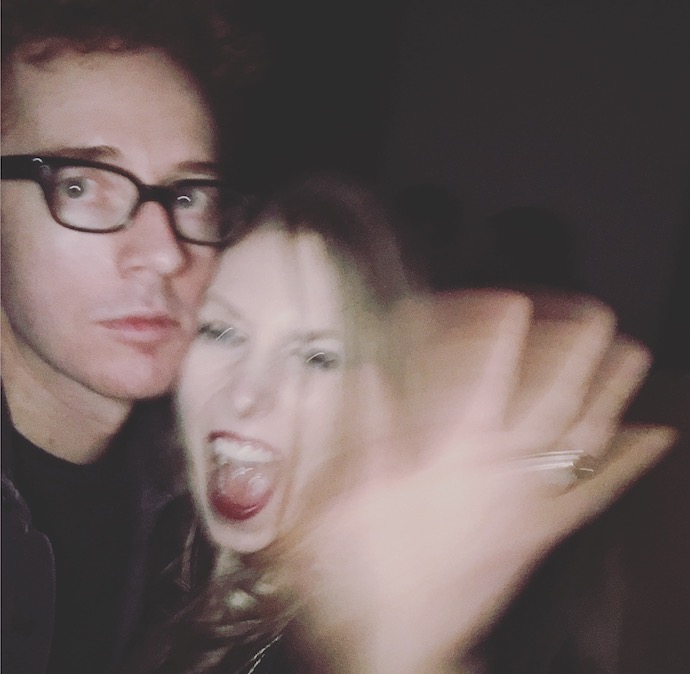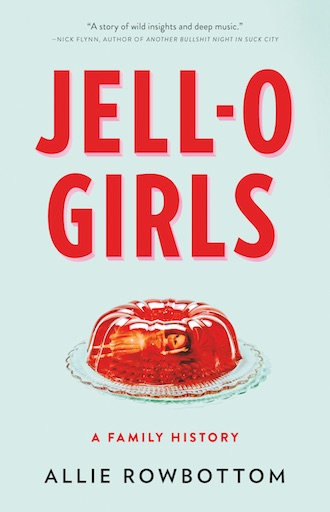Anxious Magic: A Tarot Interview with Allie Rowbottom
24.07.18

Allie Rowbottom sat down with me, her husband, for a tarot reading and interview on July 4th, 2018 in an occult library of Alaskan artifacts, carved whale bone and walrus ivory, on the second-floor of her surrogate aunt’s brownstone on the Upper West Side of Manhattan, situated atop a ley line nexus. The library faces North West, its window looks out over an NYPD substation, where police in blue uniforms grill hamburgers for the somber holiday. As I shuffle the deck of tarot cards, everything feels unsettled and out of place. Our two dogs are uneasy and a fat black bottlefly circles the room. Initially, I’d intended to use the cards to guide our interview and produce a window into Allie’s artistic process. The resultant conversation is indeed such a window, but wider than I’d expected.
Allie is the daughter of the last undulations of the Jell-O fortune, and a Mayflower pilgrim who bankrupted when Enron crashed. She was raised in the mystic tradition of artists who were nurtured as artists from birth. I am the son of a waitress turned ICU nurse turned mental patient, and a red-headed surf bound lothario, who, looking for a one-night stand, wound up with me.
Unlike my kidhood, on the beach, or at home in my mom’s empty apartment, belly down on the carpet, sucking bean paste from Taco Bell burritos – Allie’s childhood was spent freckled in the runoff of her mother’s oil paints, or on horseback in the show ring, or shoveling shit from stalls, or waiting patiently as her mother sat at the typewriter composing the memoir which she believed would free all mothers and daughters from “the Jell-O curse.” This curse, and the lives it affected, are the subject of Allie’s debut book, JELL-O GIRLS, a reimagining of her mother’s story, available July 24th from Little Brown.
Our interview was conducted with the aid of Doreen Virtue’s 44-card tarot deck of Magical Mermaids and Dolphin Oracle Cards, reposado tequila, and 3/1 CBD/THC.
– Jon Lindsey

Allie: I have a question. Is there any specific topic or question to this card reading and interview or is it about my life in general?
Jon: Just be open. Relinquish control to the cards.
Before we start. What do you think the cards will say?
A: I feel like the card representing my past will be sad and dark. And the present will be something transitional. On the threshold. I hope the future is something positive and grounded. That is my hope.
J: Are you worried?
A: Yeah, I’m worried that they’ll just be random and not meaningful. But most of the time every card is designed to have meaning.
J: If your cards were random, what would that mean to you?
A: We would have to do it over.
Allie takes the cards from me and cuts the deck to reveal three cards representing her past, present, and future. The cards don’t make much sense. We spend several minutes arguing about how to read the cards for meaning.
A: Should we do this over?
J: Yeah, I guess.
A: I think we need more of a plan for the interview.
J: No, I just want to talk. I don’t want to be so regimented.
A: But I feel like you are being rigid about this.
J: I’m asking you a question, but for some reason we’re arguing about what the cards say.
Allie cuts the deck again. This time revealing one card at a time.
The first card is “Time to Move On”. The card depicts a woman, who resembles Sandra Bullock, emerging from shore break waves. It says: “First let go emotionally and intellectually … Ask Heaven to help you make this transition, and don’t plan scheme, or worry about how your letting-go will occur …”
A: This is really personal. That’s okay. I don’t care.
J: (laughing) Well, you’re writing is pretty personal.
A: (laughing) I really don’t care. Obviously, I don’t care. Okay, so I was just thinking about this. I just feel like I’m at this place where I’m about to really release some of my old compulsive behaviors that I still have. Even just the idea of myself as an anxious compulsive person.
J: In the past, you’ve talked to me a lot about your anxiety being a driving force for your writing. So is there fear that by letting go of that concept of yourself, your writing will suffer?
A: Not so much, lately. Maybe I just don’t care as much anymore if my writing suffers. Yeah, I don’t care as much. Because for a while I was feeling like good things were happening and I wasn’t enjoying them. And it was like, what’s the point? If I can’t enjoy good things when they happen because I’m too anxious and self-punishing, what am I doing? There’s something profoundly sad about always moving on to the next thing, the next test to prove that one is deserving.
J: So in that case, it’s like the very thing that is allowing you to achieve, is not allowing you to enjoy your achievements?
A: I think the driving force of any perfectionistic or obsessive behavior or addictive behavior, is to stanch what feels like a defective hole inside of you that only you know about and other people can’t see. And the idea is that once you fill it then you’ll be good enough and you can rest and rejoin the land of the living but you’re never going to feel good enough.
J: Where in you does that come from?
A: I don’t know. It’s actually the subject of my next book, which is a nonfiction investigation of my childhood as a competitive horseback rider and its relationship to my perfectionism.
J: Do you think your anxiety and perfectionism caused you to try and control our first attempt at reading the Mermaid & Dolphin Oracle cards?
A: I think my anxiety over you not being a fastidious person is what drove me to try and control our first reading.
J: You didn’t trust me?
A: No that’s not it. I didn’t trust that you had properly planned and put in place the structure that would be needed.
J: Because I didn’t. But why weren’t you able to trust the magic of the cards to direct our interview?
A: I saw that you weren’t preparing. And I want to put content out around the publication of my book so I want this interview to be useful. I have your time right now, so I want to use it.
J: You’re trying to control me and my time.
A: Yeah. It’s like if someone gives you a gift card for a massage, you want to make sure you get the best masseuse.
J: Do you think there’s any contradiction between what you said at the beginning of this interview, about letting go of perfectionism, and where we are now?
A: No. Because, listen: my controlling perfectionistic behavior has been with me since childhood. I am 32 years old. You don’t just say, “Okay, I’m done,” and let that shit go. It’s a process. So yes I am saying I need more therapy.
Allie pulls the “Explore Your Options” card. Pictured on the card is a baby mermaid reaching for a sea turtle.
J: You love turtles.
A: Sea turtles are my spirit animal, according to an internet quiz I took.
The card says, “It’s time to look at other possibilities. It’s a good time to make changes.”
J: What is it about turtles?
A: I don’t know. I relate to the shell, and the tenderness beneath the shell. If they trust you enough, they’ll come out of their shell. But if you scare them they’ll go right back in. They’re the same as all of us. They’re self-protecting and trying to keep from getting hurt.
CARD: By drawing this card heaven now asks you to question any situation that you think can’t be changed.
J: What does this make you think of?
A: My mom. Your mom.
(The day before this interview my mom, whose mental illness causes her to sometimes stage elaborate grabs for attention and extra opioids, fractured her shoulder in a fall, which was most likely intentional)
J: In a lot of ways, we have changed the situation with my mom. I feel like for a long time I came to her situation with the mindset that nothing could change. But we’ve done a lot to alter the dynamic.
A: Well we’ve changed the externals. But the emotional stuff is in process. In that relationship, it is often you trying to control her. Trying to will her to get better. Altering the dynamic has meant accepting that she is not going to heal in this lifetime and…grieving.
J: Are there other situations in your life that you’d like to change but feel like you can’t?
 A: I don’t feel like anything can’t be changed. Except, obviously I wish my mom wasn’t dead. I don’t see any way of changing that. I end JELL-O GIRLS this way, by saying that sometimes I think that I can hear my mom but then I think no: that’s me. It’s my own inner mother voice and that’s what I’m going to have to conjure for the rest of my life. Finding her inside myself is an example of looking differently at what seems unchangeable. But that’s really hard to do at times.
A: I don’t feel like anything can’t be changed. Except, obviously I wish my mom wasn’t dead. I don’t see any way of changing that. I end JELL-O GIRLS this way, by saying that sometimes I think that I can hear my mom but then I think no: that’s me. It’s my own inner mother voice and that’s what I’m going to have to conjure for the rest of my life. Finding her inside myself is an example of looking differently at what seems unchangeable. But that’s really hard to do at times.
Which is an interesting thing about writing, especially non-fiction: you’re writing about a life and the life is in progress. I might end JELL-O GIRLS by saying, “I need to conjure this inner mother voice.” And it may sound like a strong, peaceful ending. But in reality, that’s really hard for me to do.
J (reading card): Take a moment and pretend that a magical mermaid will grant you three wishes. You can have anything you want. What will you wish for?
A: This is not hard for me. I want emotional/spiritual peace. A supreme chill. That’s not to say that in this vision I don’t have a range of emotions. I just want a baseline peace. No big dramas. Sadness, joy, the range. But no crazy dramas.
J: That hasn’t been the case in our three years of marriage.
(Allie’s mom died the summer we were married, grief ensued, a car accident, a flood. Then our dog died. We moved twice, Allies dad started dating her childhood friend, and my mom, previously somewhat stable, began to unravel in some really traumatic ways)
A: Yeah. Magical Mermaid, I would like to be done, thanks.
J: What’s your second wish?
A: Perfect physical health. The continuation of a long healthy life, for you and I, a life that’s free of medical problems.
J: Are you haunted by a fear of illness?
A: Yes. Because of my mom it seems really possible to me.
J: How old do you want to be when you die?
A: I want to be an old lady. I really like to be alive. I’m also terrified of death.
J: Your dad is really scared of dying too. Why do you think?
A: That’s really interesting … (30 second pause while considering the question). My dad’s a very anxious person. For a lot of people, the root of anxiety is a crushing fear of death. It’s a fear of the unknown, and death is the ultimate unknown.
J: Is anxiety related to control?
A: Anxiety narrows the scope of life. You’re so worried about what’s going on in your head that you can’t look around and see that other people are suffering, other people are having a good time. Life is happening, whether or not you’re participating in it. It’s not all about you.
J: How does that tendency impact your writing, particularly as a memoirist?
A: It’s good and bad. Everybody has internal angst. Some people feel it, while some people mask and repress. If you can tap into what it actually is to experience those anxieties then you’re chronicling an experience that everybody has, to a certain degree, then you’re airing what culturally we’re not encouraged to expose. That’s something that people want to read.
J: Why are readers so attracted to that? Is it because they have trouble accessing it in themselves or because they want affirmation?
A: Both. There’s so much shame around “negative” feelings and landscapes. But it’s healing to say the ugliest thing inside you and then learn that the world still spins. And what’s more, it’s healing to learn that other people have had the exact same feeling. If the thing that fuels anxiety is a sense of specialness and myopia, then the way to recovery is through sharing it and seeing that other people feel that way too – you’re not different.
J: What’s your third wish?
A: I had a couple of ideas, but they seem too controlling. When you’re bringing other people into your wishes, you’re subtly trying to control them. Like, if I were to wish for us to have a wonderful, long, healthy, happy marriage until we die. Then I might be trying to manipulate you. So I am going to say that I wish for the opportunity to be of service to others through my work both on the page and in the classroom.
The last card Allie draws is “Synchronicity.” The card depicts two dolphins leaping over a cluster of rose quartz crystals. The card says: “You may already know that there are no coincidental or accidental occurrences. This card reflects your recent focus on positive thoughts, which are being directed toward your desires. Like a magical energy beam that can influence physical objects, your optimism and faith are reshaping your life into a masterpiece that reflects your higher self.”
J: Do you feel like you’re seeing synchronicity in your life right now?
A: Yes, but it’s a recent shift. When my mom died, it became hard for me to focus on the positive, speak to the universe, and believe in manifestation. Which I generally, really believe in. There’s a place inside me where my inner voice dwells, a place where I’m truthful and centered, and tapped in.
But over the last few years that place has been hard for me to access, and a lot has fallen apart because of that. When things fall apart it’s because I’m not able to hear my inner voice.
J: You lost faith?
A: Yeah. I lost trust. But for the past couple of months I’ve been trying to ask the universe for what it is that I want, and to trust that whatever happens, I’m held by something greater than me. It sounds religious, but I don’t see it that way. I see it as how I am happiest moving through the world.
I know there’s a myth of the miserable writer, the addictive or anxious artist. And maybe artists are more addictive or anxious than like, bankers. Or maybe they just have easier access to their own emotional landscape. But I don’t think I have to be anxious or depressed to write. Actually, I know I don’t have to be. Schlocky as it may sound, my best work always comes from hope and love.